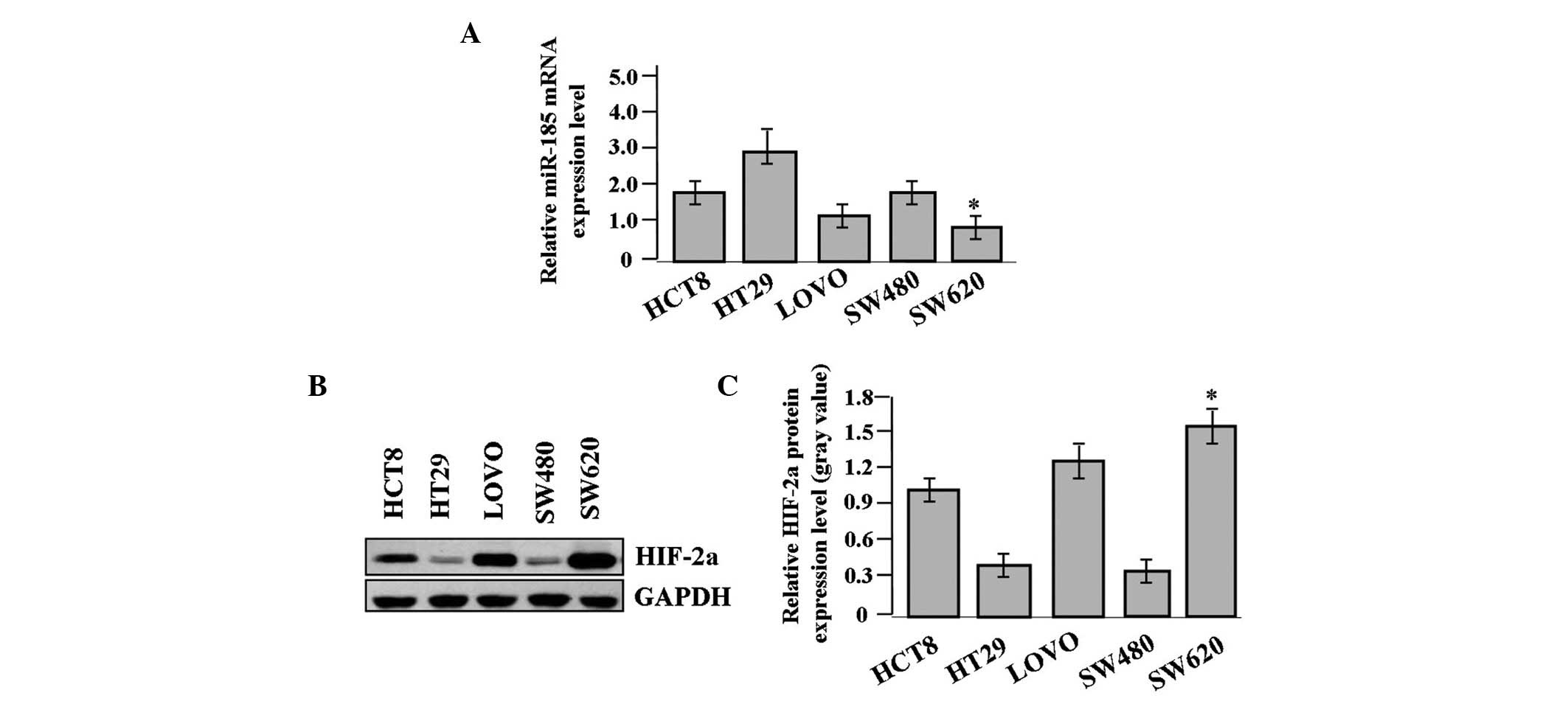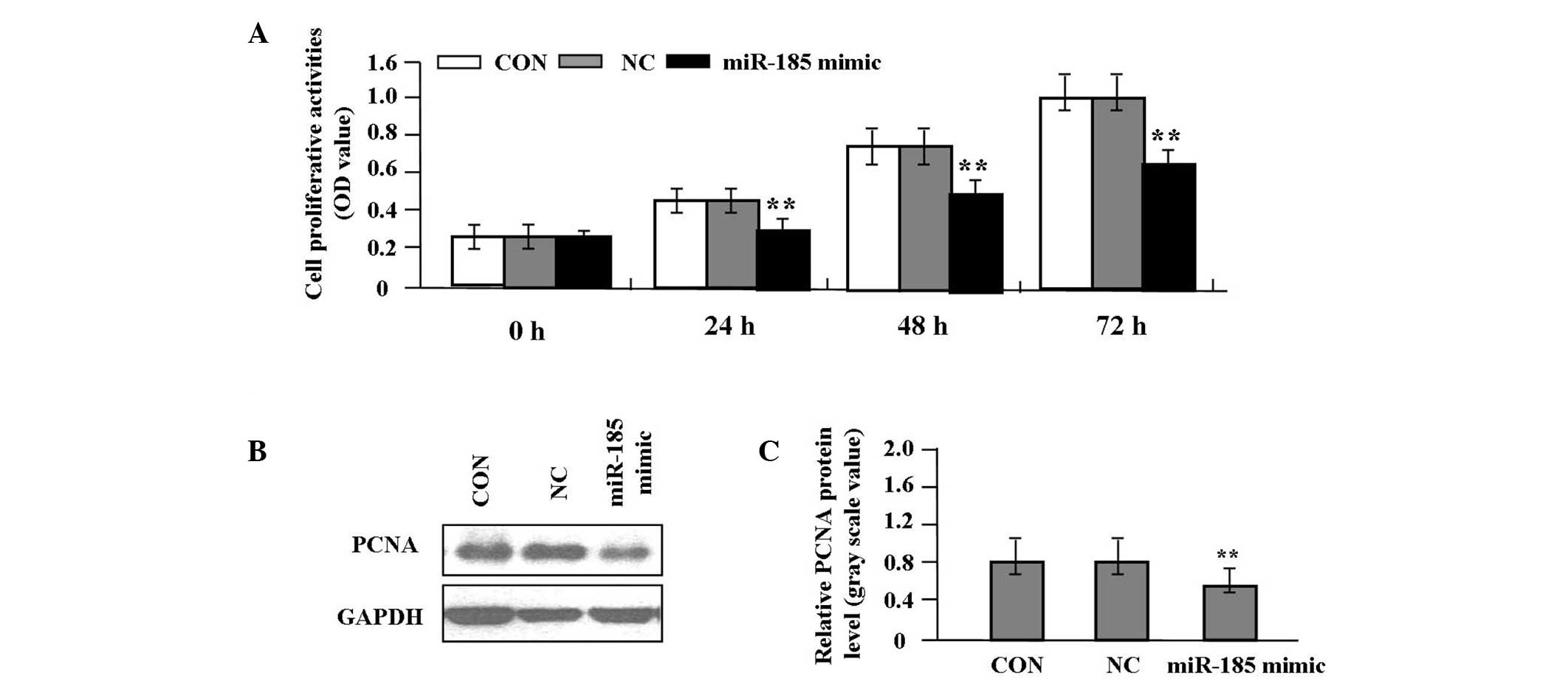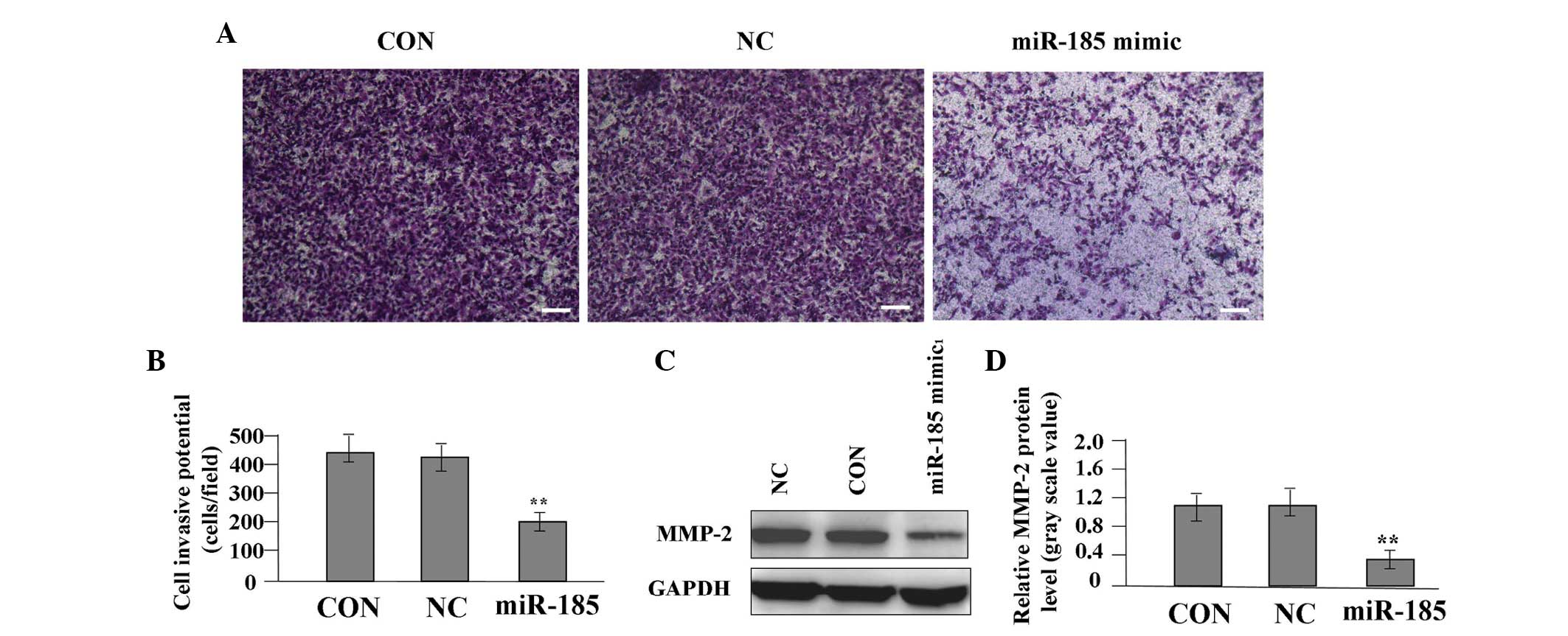|
1
|
Antonic V, Stojadinovic A, Kester KE, et
al: Significance of infectious agents in colorectal cancer
development. J Cancer. 4:227–240. 2013. View Article : Google Scholar
|
|
2
|
He L and Hannon GJ: MicroRNAs: small RNAs
with a big role in gene regulation. Nat Rev Genet. 5:522–531. 2004.
View Article : Google Scholar : PubMed/NCBI
|
|
3
|
Xu B, Hsu PK, Stark KL, et al:
Derepression of a neuronal inhibitor due to miRNA dysregulation in
a schizophrenia-related microdeletion. Cell. 152:262–275. 2013.
View Article : Google Scholar : PubMed/NCBI
|
|
4
|
Liu Y, Chen SH, Jin X and Li YM: Analysis
of differentially expressed genes and microRNAs in alcoholic liver
disease. Int J Mol Med. 31:547–554. 2013.PubMed/NCBI
|
|
5
|
Wang L, Jia XJ, Jiang HJ, et al: MicroRNAs
185, 96, and 223 repress selective high density lipoprotein
cholesterol uptake through posttranscriptional inhibition. Mol Cell
Biol. 33:1956–1964. 2013. View Article : Google Scholar
|
|
6
|
Qu F, Cui X, Hong Y, et al: MicroRNA-185
suppresses proliferation, invasion, migration, and tumorigenicity
of human prostate cancer cells through targeting androgen receptor.
Mol Cell Biochem. 377:121–130. 2013. View Article : Google Scholar
|
|
7
|
Takahashi Y, Forrest AR, Maeno E, et al:
MiR-107 and MiR-185 can induce cell cycle arrest in human non small
cell lung cancer cell lines. PLoS One. 4:e66772009. View Article : Google Scholar : PubMed/NCBI
|
|
8
|
Yao Y, Suo AL, Li ZF, et al: MicroRNA
profiling of human gastric cancer. Mol Med Rep. 2:963–970.
2009.PubMed/NCBI
|
|
9
|
Gottardo F, Liu CG, Ferracin M, et al:
Micro-RNA profiling in kidney and bladder cancers. Urol Oncol.
25:387–392. 2007. View Article : Google Scholar : PubMed/NCBI
|
|
10
|
Hanahan D and Weinberg RA: Hallmarks of
cancer: the next generation. Cell. 144:646–674. 2011. View Article : Google Scholar : PubMed/NCBI
|
|
11
|
Mannoor K, Liao J and Jiang F: Small
nucleolar RNAs in cancer. Biochim Biophys Acta. 1826:121–128.
2012.PubMed/NCBI
|
|
12
|
Yu G, Tang JQ, Tian ML, et al: Prognostic
values of the miR-17–92 cluster and its paralogs in colon cancer. J
Surg Oncol. 106:232–237. 2012.
|
|
13
|
Liu H, Brannon AR, Reddy AR, et al:
Identifying mRNA targets of microRNA dysregulated in cancer: with
application to clear cell Renal Cell Carcinoma. BMC Syst Biol.
4:512010. View Article : Google Scholar : PubMed/NCBI
|
|
14
|
Yang Y, Li X, Yang Q, et al: The role of
microRNA in human lung squamous cell carcinoma. Cancer Genet
Cytogenet. 200:127–133. 2010. View Article : Google Scholar : PubMed/NCBI
|
|
15
|
Akçakaya P, Ekelund S, Kolosenko I, et al:
miR-185 and miR-133b deregulation is associated with overall
survival and metastasis in colorectal cancer. Int J Oncol.
39:311–318. 2011.PubMed/NCBI
|
|
16
|
Tang H, Wang Z, Liu X, et al: LRRC4
inhibits glioma cell growth and invasion through a
miR-185-dependent pathway. Curr Cancer Drug Targets. 12:1032–1042.
2012. View Article : Google Scholar : PubMed/NCBI
|
|
17
|
Imam JS, Buddavarapu K, Lee-Chang JS, et
al: MicroRNA-185 suppresses tumor growth and progression by
targeting the Six1 oncogene in human cancers. Oncogene.
29:4971–4979. 2010. View Article : Google Scholar : PubMed/NCBI
|
|
18
|
Greenberg E, Hershkovitz L, Itzhaki O, et
al: Regulation of cancer aggressive features in melanoma cells by
microRNAs. PLoS One. 6:e189362011. View Article : Google Scholar : PubMed/NCBI
|
|
19
|
Xiang Y, Ma N, Wang D, et al: MiR-152 and
miR-185 co-contribute to ovarian cancer cells cisplatin sensitivity
by targeting DNMT1 directly: a novel epigenetic therapy independent
of decitabine. Oncogene. 33:378–386. 2014. View Article : Google Scholar : PubMed/NCBI
|
|
20
|
Liu M, Lang N, Chen X, et al: miR-185
targets RhoA and Cdc42 expression and inhibits the proliferation
potential of human colorectal cells. Cancer Lett. 301:151–160.
2011. View Article : Google Scholar : PubMed/NCBI
|
|
21
|
Ho JJ, Metcalf JL, Yan MS, et al:
Functional importance of Dicer protein in the adaptive cellular
response to hypoxia. J Biol Chem. 287:29003–29020. 2012. View Article : Google Scholar : PubMed/NCBI
|
|
22
|
Gordan JD, Bertout JA, Hu CJ, et al:
HIF-2α promotes hypoxic cell proliferation by enhancing c-myc
transcriptional activity. Cancer Cell. 11:335–347. 2007.
|
|
23
|
Xue X, Taylor M, Anderson E, et al:
Hypoxia-inducible factor-2α activation promotes colorectal cancer
progression by dysregulating iron homeostasis. Cancer Res.
72:2285–2293. 2012.
|
|
24
|
Burkitt K, Chun SY, Dang DT, et al:
Targeting both HIF-1 and HIF-2 in human colon cancer cells improves
tumor response to sunitinib treatment. Mol Cancer Ther.
8:1148–1156. 2009. View Article : Google Scholar
|
|
25
|
Naryzhny SN: Proliferating cell nuclear
antigen: a proteomics view. Cell Mol Life Sci. 65:3789–3808. 2008.
View Article : Google Scholar : PubMed/NCBI
|
|
26
|
Wilson MS and Schofield PF: Markers to
study human colonic cell proliferation. Gut. 36:1521995. View Article : Google Scholar : PubMed/NCBI
|
|
27
|
Baker EA, Bergin FG and Leaper DJ: Matrix
metalloproteinases, their tissue inhibitors and colorectal cancer
staging. Br J Surg. 87:1215–1221. 2000. View Article : Google Scholar
|
|
28
|
Fujiwara S, Nakagawa K, Harada H, et al:
Silencing hypoxia-inducible factor-1α inhibits cell migration and
invasion under hypoxic environment in malignant gliomas. Int J
Oncol. 30:793–802. 2007.
|
|
29
|
Nakanishi K, Hiroi S, Tominaga S, et al:
Expression of hypoxia-inducible factor-1α protein predicts survival
in patients with transitional cell carcinoma of the upper urinary
tract. Clin Cancer Res. 11:2583–2590. 2005.
|




















